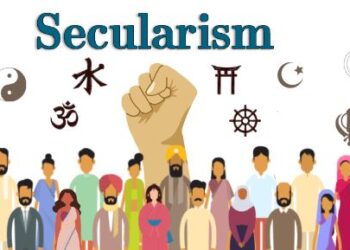The Constitution of India is the governing code of our country. The Preamble of it is the concised revelation of the basic structure of the Constitution that cannot be changed on any count. In the Preamble, through the people of India, the polity of the country it is resolved to constitute India into a Sovereign, Socialist, Secular, Democratic, Republic. The federal units of the political territories viz. States are headed by Governors. They are the constitutional governing heads of the States.
Recently, the Governor of Maharashtra Bhagat Singh Koshyari has written an official letter to the Chief Minister, Uddhav Thackeray, ridiculing him for having turned ‘Secular’! In respect of opening of temples and other worshipping places for the public, the CM was very firm in maintaining the status quo of keeping them closed until the normalcy gets restored from COVID-19 pandemic. The CM was very much committed considering the stand in the interest, safety and welfare of the public. The CM did not discriminate in continuing the condition of the worshipping places, whatever religion the devotees visiting such places belong to and whatever belief they possess and practise. This is expected of an elected leader to govern the State. The gubernatorial positioned Governor has ridiculed the CM for having given equal treatment to all religious faith and belief and pointed out that the CM has become ‘Secular’. The CM has to be ‘Secular’ always as warranted by the governing code of the country. Acting contrary to it has only to be questioned by the Governor. The governor may have preference in any particular faith and belief as an individual. Such preference should not interfere while acting in the gubernatorial position like Governor. In fact, the Governor must have appreciated the stand of the CM for being ‘Secular’.
The post of Governor is in fact contrary to the democratic polity. At the Centre, the head of the country is President of India and the Prime Minister is the decision making head of Council of Ministers on whose advice the President has to act. Both of them are elected directly by the people or by the representatives who are already elected by the people. In States, the CM post warrants the democratic means of being elected by the people of the respective State.
Whereas the Governor post is filled only through appointment by the Centre. No iota of democratic representation is associated with the State Governorship. This contrarian concept is anathema to the democratic polity of the country. In democratic polity, the elected representatives have got governing rights which the people have mandated. Such governing positions cannot be belittled or ridiculed by the appointed governorship. The State Governors have to act as per the advice of the CM as the head of council of ministers in the respective State.
The comments passed by the Maharashtra State Governor on the decision of the CM is not over reach; the reach itself is unwarranted; further reaching contrary to the constitutional tenets of the country is an unbecoming act of the Governor.
There has been existing a tendency of consistency on the part of Governors of several States to attempt at the unwarranted reach in the governance of the States. After the BJP assumed the rule of the Centre, such unwarranted reach has been alarming in many States. Explicitly it had already exploded in West Bengal, when the Governor Dhankar openly suggesting that the police officials and the bureaucrats should perform their duties as ‘public servants and not political workers’. Only the CM with the Council of Ministers are vested with the direct and immediate governing responsibility.
Now it is the turn in the State of Maharashtra. Such unwarranted reach occurs only in the States ruled by non BJP party which are not in the ruling alliance with the BJP at the Centre. Does the BJP victimise the States ruled by parties other than them through their appointed Governor? Encouraging the undemocratic as well as unconstitutional deeds of gubernatorial position is a violation. The Centre is at the position of questioning the unconstitutional actions of such Governors. But the present authority of BJP at the Centre maintains the strategic silence. Such silence should not undermine the very fabric of the secular, democratic feature of the Constitution. Anarchism should not prevail over the constitutional governance. The concerned Governors, especially in Maharashtra has to be called for explanation for ridiculing the State CM, for being ‘Secular’.
The ‘anti-democratic’ feature assigned to the post of State Governors, governing as the head of the State, controlling the decisions made by the State Council of Ministers and the State Legislatures, whose members are duly elected by the electoral college, was commented by Anna (endearing form of C.N. Annadurai) chief disciple of Periyar E.V.R. even before his becoming the Chief Minister of State of Tamil Nadu thus:
“No purpose serves through the beard to goats and so, the post of Governors to the States.”
The probability of whipping up the federal functioning of the country is lacking, but the unitary form of governance, contrary to the Constitution tenets is carried out by the BJP headed rule at the Centre. The gubernatorial position of State Governor, does not discharge the responsibility as envisioned by the founding fathers of Indian Constitution. It is better to abolish the post of State Governors. Earlier the better, before the condition worsens by arresting the Governance of the State by the duly elected CM as the head of Council of Ministers acting as per the approval State Legislatures.
To prove the due respect to the Indian Constitution, may the BJP rule at the Centre recall the Governor from the State of Maharashtra? Otherwise the ultimate political masters – people of the country would dethrone their representatives appropriately at the time of election as in the same manner of enthroning!









